Unit 3: Professional Identity and Practice
VerifiedAdded on 2023/01/12
|12
|3390
|41
AI Summary
Contribute Materials
Your contribution can guide someone’s learning journey. Share your
documents today.
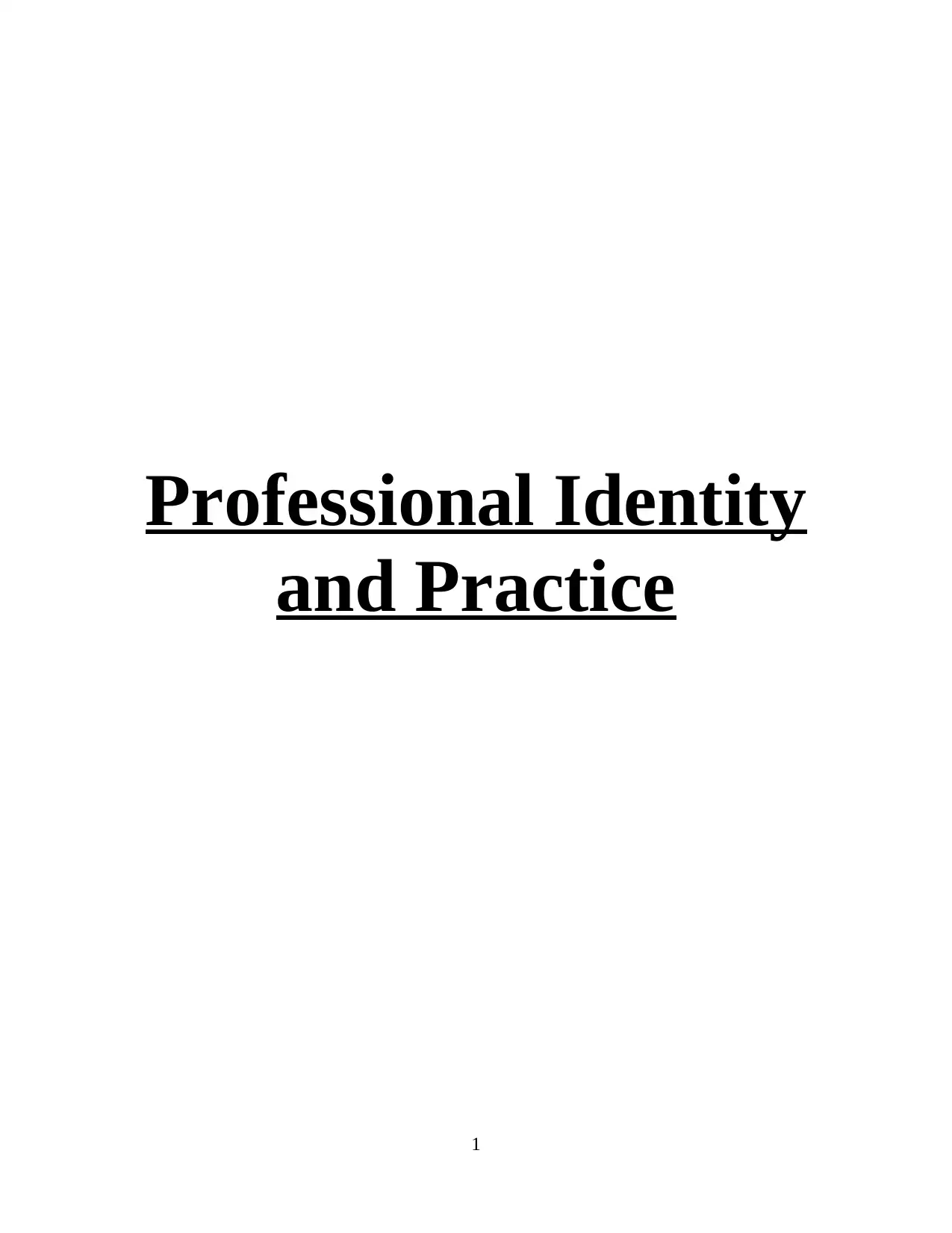
Professional Identity
and Practice
1
and Practice
1
Secure Best Marks with AI Grader
Need help grading? Try our AI Grader for instant feedback on your assignments.
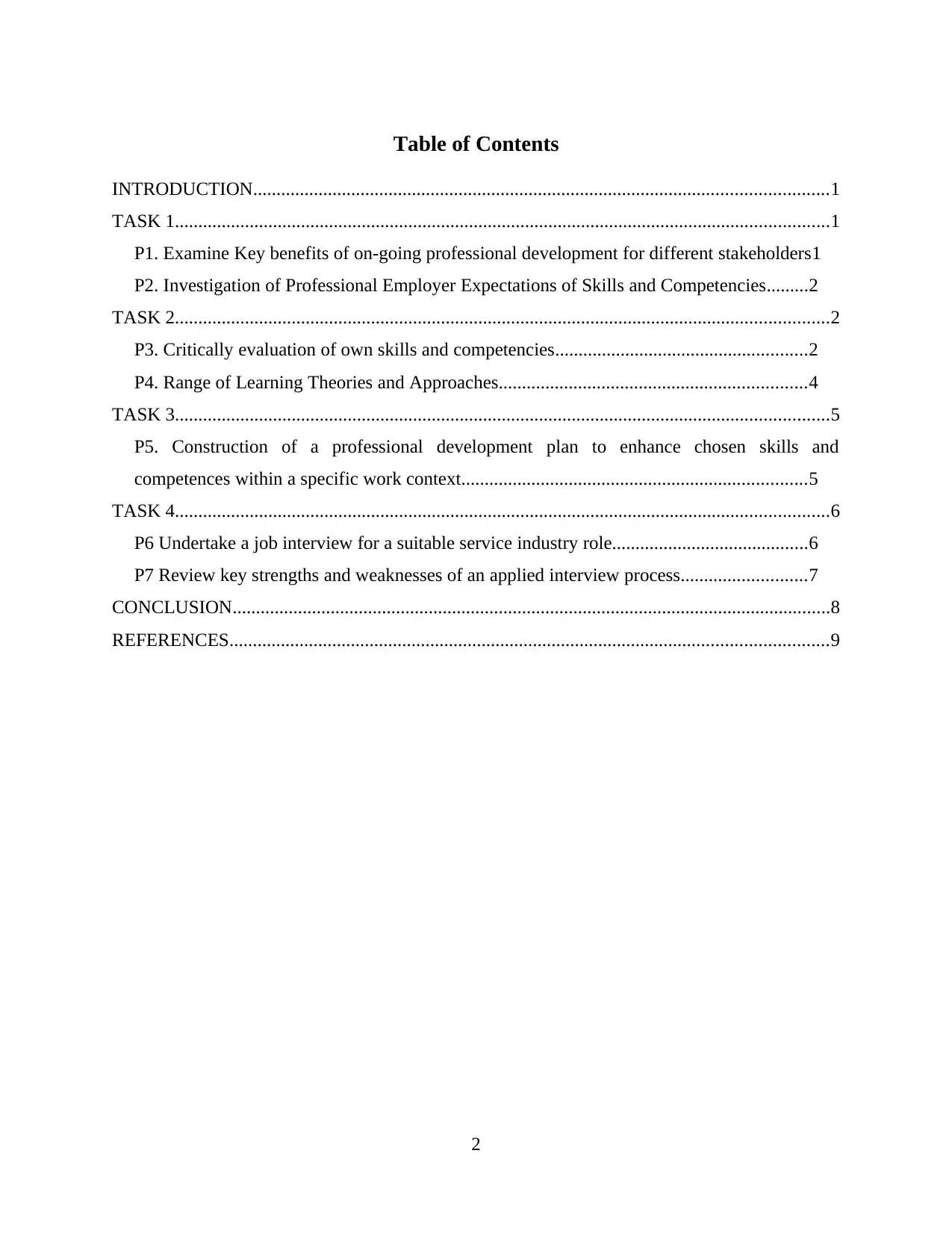
Table of Contents
INTRODUCTION...........................................................................................................................1
TASK 1............................................................................................................................................1
P1. Examine Key benefits of on-going professional development for different stakeholders1
P2. Investigation of Professional Employer Expectations of Skills and Competencies.........2
TASK 2............................................................................................................................................2
P3. Critically evaluation of own skills and competencies......................................................2
P4. Range of Learning Theories and Approaches..................................................................4
TASK 3............................................................................................................................................5
P5. Construction of a professional development plan to enhance chosen skills and
competences within a specific work context..........................................................................5
TASK 4............................................................................................................................................6
P6 Undertake a job interview for a suitable service industry role..........................................6
P7 Review key strengths and weaknesses of an applied interview process...........................7
CONCLUSION................................................................................................................................8
REFERENCES................................................................................................................................9
2
INTRODUCTION...........................................................................................................................1
TASK 1............................................................................................................................................1
P1. Examine Key benefits of on-going professional development for different stakeholders1
P2. Investigation of Professional Employer Expectations of Skills and Competencies.........2
TASK 2............................................................................................................................................2
P3. Critically evaluation of own skills and competencies......................................................2
P4. Range of Learning Theories and Approaches..................................................................4
TASK 3............................................................................................................................................5
P5. Construction of a professional development plan to enhance chosen skills and
competences within a specific work context..........................................................................5
TASK 4............................................................................................................................................6
P6 Undertake a job interview for a suitable service industry role..........................................6
P7 Review key strengths and weaknesses of an applied interview process...........................7
CONCLUSION................................................................................................................................8
REFERENCES................................................................................................................................9
2
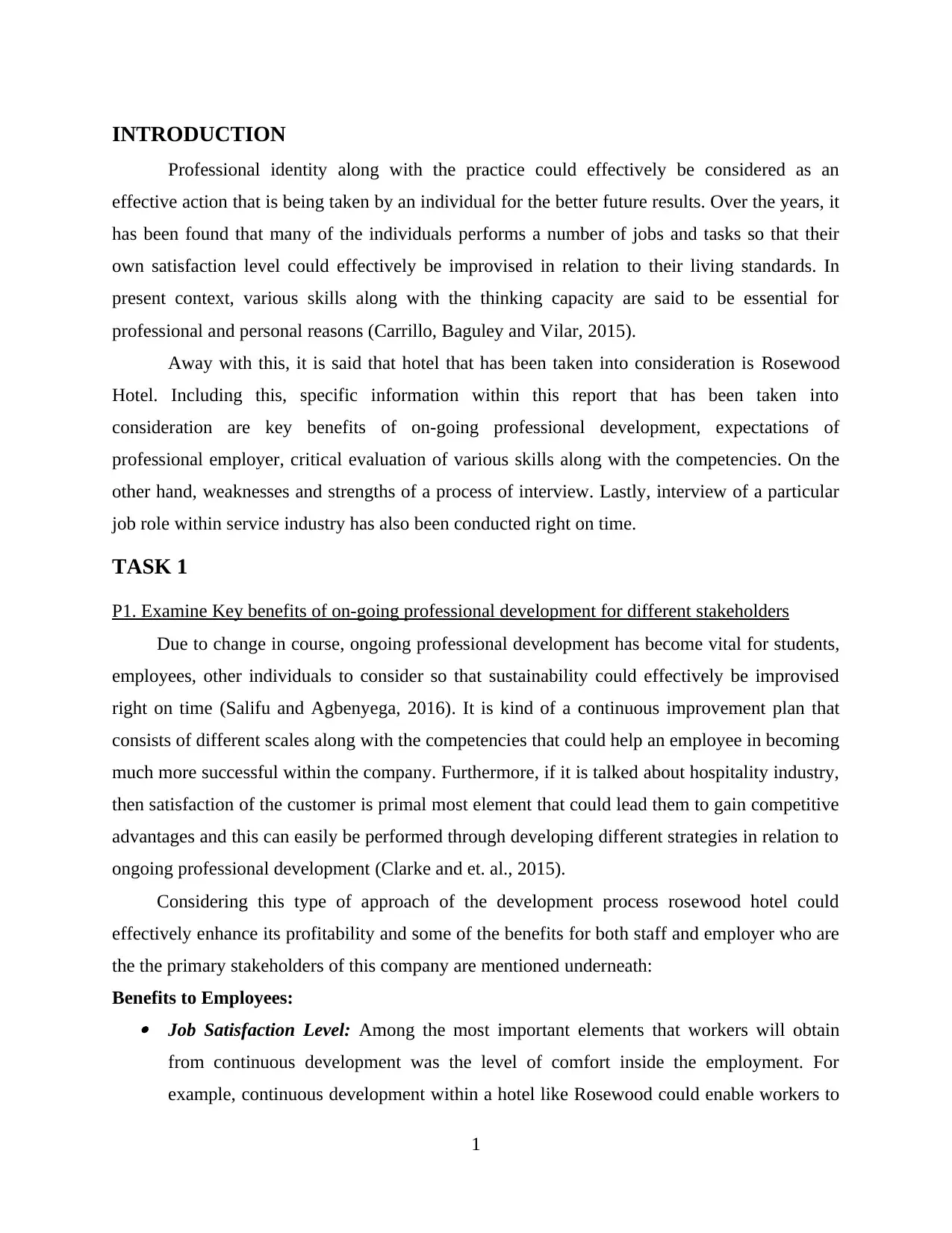
INTRODUCTION
Professional identity along with the practice could effectively be considered as an
effective action that is being taken by an individual for the better future results. Over the years, it
has been found that many of the individuals performs a number of jobs and tasks so that their
own satisfaction level could effectively be improvised in relation to their living standards. In
present context, various skills along with the thinking capacity are said to be essential for
professional and personal reasons (Carrillo, Baguley and Vilar, 2015).
Away with this, it is said that hotel that has been taken into consideration is Rosewood
Hotel. Including this, specific information within this report that has been taken into
consideration are key benefits of on-going professional development, expectations of
professional employer, critical evaluation of various skills along with the competencies. On the
other hand, weaknesses and strengths of a process of interview. Lastly, interview of a particular
job role within service industry has also been conducted right on time.
TASK 1
P1. Examine Key benefits of on-going professional development for different stakeholders
Due to change in course, ongoing professional development has become vital for students,
employees, other individuals to consider so that sustainability could effectively be improvised
right on time (Salifu and Agbenyega, 2016). It is kind of a continuous improvement plan that
consists of different scales along with the competencies that could help an employee in becoming
much more successful within the company. Furthermore, if it is talked about hospitality industry,
then satisfaction of the customer is primal most element that could lead them to gain competitive
advantages and this can easily be performed through developing different strategies in relation to
ongoing professional development (Clarke and et. al., 2015).
Considering this type of approach of the development process rosewood hotel could
effectively enhance its profitability and some of the benefits for both staff and employer who are
the the primary stakeholders of this company are mentioned underneath:
Benefits to Employees: Job Satisfaction Level: Among the most important elements that workers will obtain
from continuous development was the level of comfort inside the employment. For
example, continuous development within a hotel like Rosewood could enable workers to
1
Professional identity along with the practice could effectively be considered as an
effective action that is being taken by an individual for the better future results. Over the years, it
has been found that many of the individuals performs a number of jobs and tasks so that their
own satisfaction level could effectively be improvised in relation to their living standards. In
present context, various skills along with the thinking capacity are said to be essential for
professional and personal reasons (Carrillo, Baguley and Vilar, 2015).
Away with this, it is said that hotel that has been taken into consideration is Rosewood
Hotel. Including this, specific information within this report that has been taken into
consideration are key benefits of on-going professional development, expectations of
professional employer, critical evaluation of various skills along with the competencies. On the
other hand, weaknesses and strengths of a process of interview. Lastly, interview of a particular
job role within service industry has also been conducted right on time.
TASK 1
P1. Examine Key benefits of on-going professional development for different stakeholders
Due to change in course, ongoing professional development has become vital for students,
employees, other individuals to consider so that sustainability could effectively be improvised
right on time (Salifu and Agbenyega, 2016). It is kind of a continuous improvement plan that
consists of different scales along with the competencies that could help an employee in becoming
much more successful within the company. Furthermore, if it is talked about hospitality industry,
then satisfaction of the customer is primal most element that could lead them to gain competitive
advantages and this can easily be performed through developing different strategies in relation to
ongoing professional development (Clarke and et. al., 2015).
Considering this type of approach of the development process rosewood hotel could
effectively enhance its profitability and some of the benefits for both staff and employer who are
the the primary stakeholders of this company are mentioned underneath:
Benefits to Employees: Job Satisfaction Level: Among the most important elements that workers will obtain
from continuous development was the level of comfort inside the employment. For
example, continuous development within a hotel like Rosewood could enable workers to
1
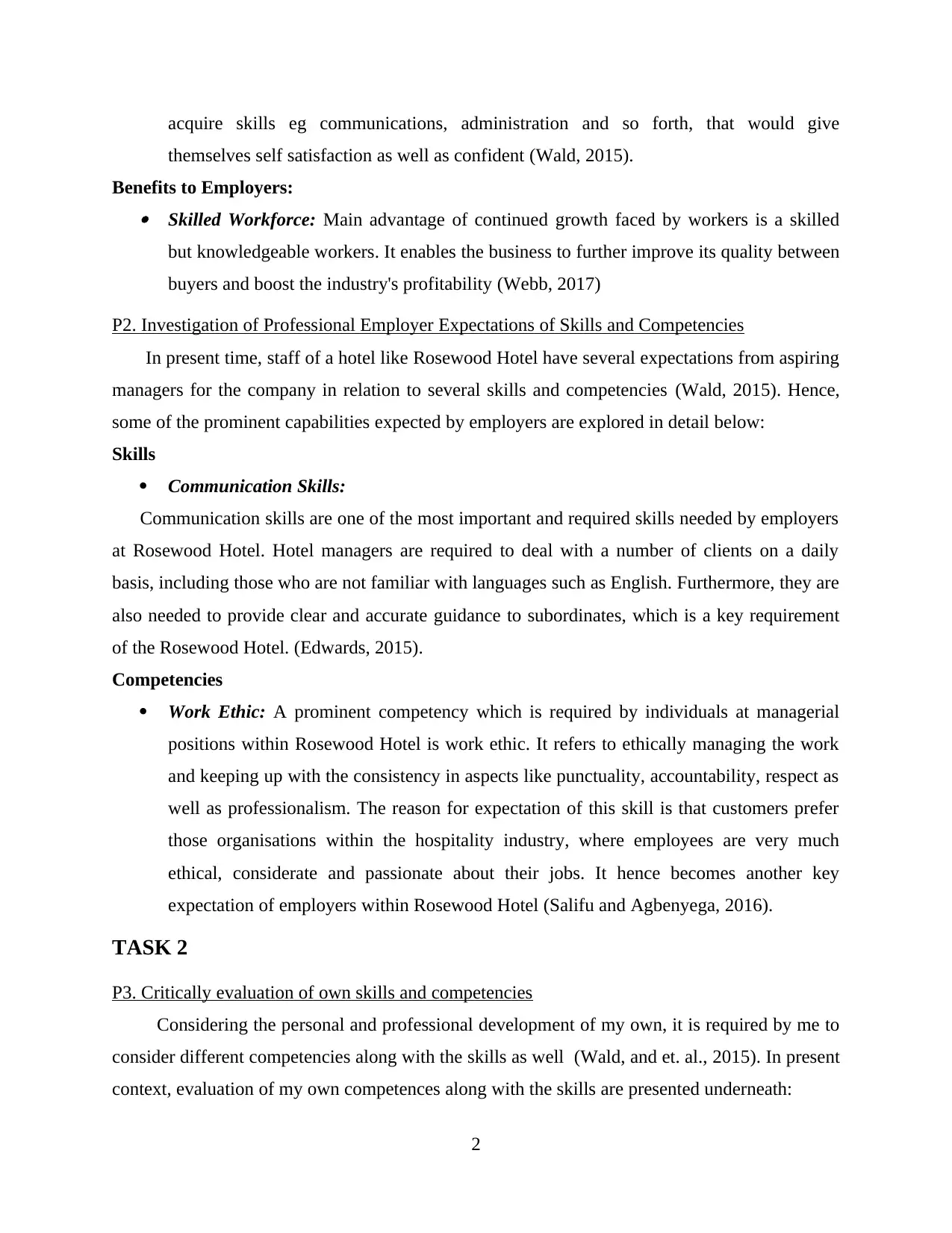
acquire skills eg communications, administration and so forth, that would give
themselves self satisfaction as well as confident (Wald, 2015).
Benefits to Employers: Skilled Workforce: Main advantage of continued growth faced by workers is a skilled
but knowledgeable workers. It enables the business to further improve its quality between
buyers and boost the industry's profitability (Webb, 2017)
P2. Investigation of Professional Employer Expectations of Skills and Competencies
In present time, staff of a hotel like Rosewood Hotel have several expectations from aspiring
managers for the company in relation to several skills and competencies (Wald, 2015). Hence,
some of the prominent capabilities expected by employers are explored in detail below:
Skills
Communication Skills:
Communication skills are one of the most important and required skills needed by employers
at Rosewood Hotel. Hotel managers are required to deal with a number of clients on a daily
basis, including those who are not familiar with languages such as English. Furthermore, they are
also needed to provide clear and accurate guidance to subordinates, which is a key requirement
of the Rosewood Hotel. (Edwards, 2015).
Competencies
Work Ethic: A prominent competency which is required by individuals at managerial
positions within Rosewood Hotel is work ethic. It refers to ethically managing the work
and keeping up with the consistency in aspects like punctuality, accountability, respect as
well as professionalism. The reason for expectation of this skill is that customers prefer
those organisations within the hospitality industry, where employees are very much
ethical, considerate and passionate about their jobs. It hence becomes another key
expectation of employers within Rosewood Hotel (Salifu and Agbenyega, 2016).
TASK 2
P3. Critically evaluation of own skills and competencies
Considering the personal and professional development of my own, it is required by me to
consider different competencies along with the skills as well (Wald, and et. al., 2015). In present
context, evaluation of my own competences along with the skills are presented underneath:
2
themselves self satisfaction as well as confident (Wald, 2015).
Benefits to Employers: Skilled Workforce: Main advantage of continued growth faced by workers is a skilled
but knowledgeable workers. It enables the business to further improve its quality between
buyers and boost the industry's profitability (Webb, 2017)
P2. Investigation of Professional Employer Expectations of Skills and Competencies
In present time, staff of a hotel like Rosewood Hotel have several expectations from aspiring
managers for the company in relation to several skills and competencies (Wald, 2015). Hence,
some of the prominent capabilities expected by employers are explored in detail below:
Skills
Communication Skills:
Communication skills are one of the most important and required skills needed by employers
at Rosewood Hotel. Hotel managers are required to deal with a number of clients on a daily
basis, including those who are not familiar with languages such as English. Furthermore, they are
also needed to provide clear and accurate guidance to subordinates, which is a key requirement
of the Rosewood Hotel. (Edwards, 2015).
Competencies
Work Ethic: A prominent competency which is required by individuals at managerial
positions within Rosewood Hotel is work ethic. It refers to ethically managing the work
and keeping up with the consistency in aspects like punctuality, accountability, respect as
well as professionalism. The reason for expectation of this skill is that customers prefer
those organisations within the hospitality industry, where employees are very much
ethical, considerate and passionate about their jobs. It hence becomes another key
expectation of employers within Rosewood Hotel (Salifu and Agbenyega, 2016).
TASK 2
P3. Critically evaluation of own skills and competencies
Considering the personal and professional development of my own, it is required by me to
consider different competencies along with the skills as well (Wald, and et. al., 2015). In present
context, evaluation of my own competences along with the skills are presented underneath:
2
Secure Best Marks with AI Grader
Need help grading? Try our AI Grader for instant feedback on your assignments.
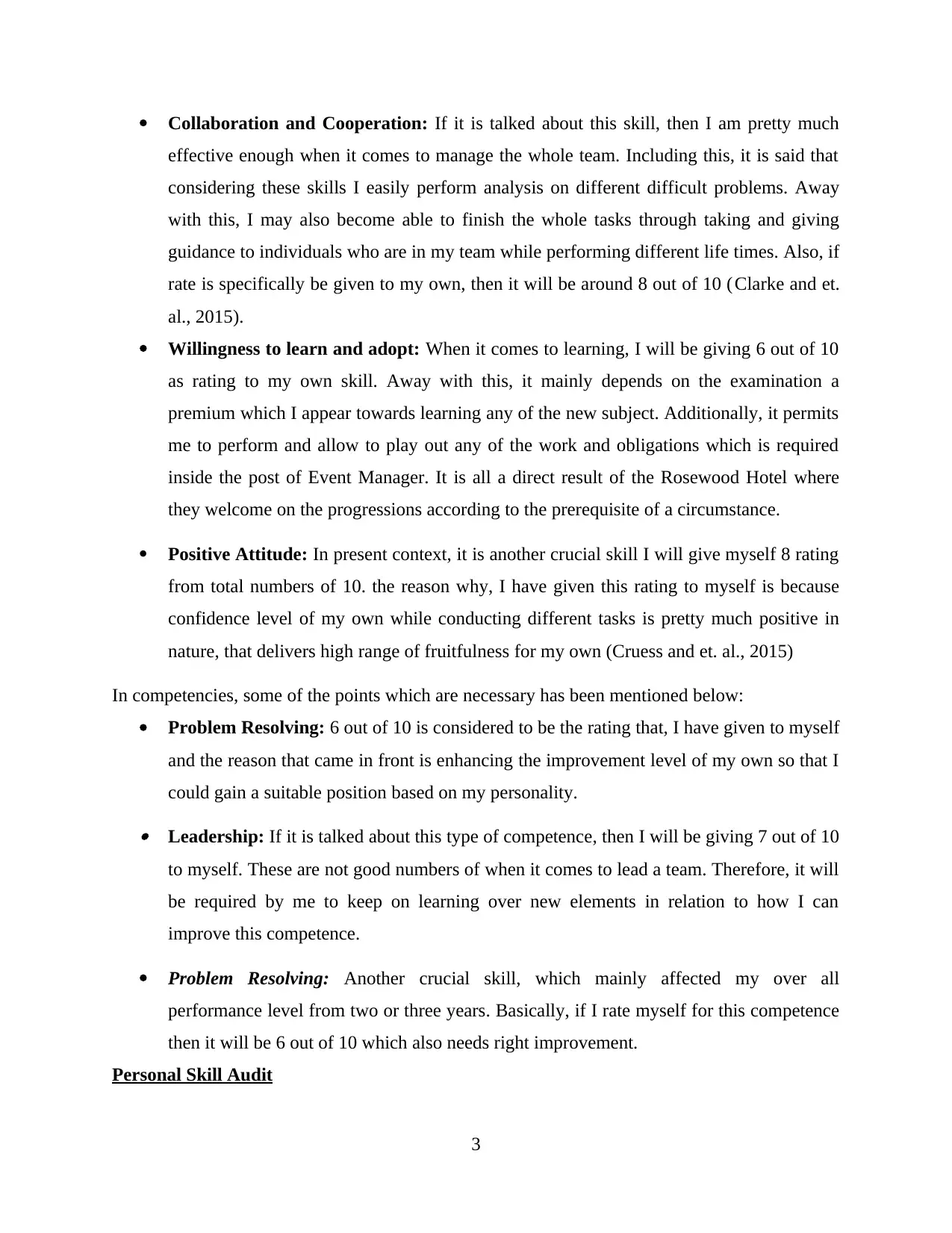
Collaboration and Cooperation: If it is talked about this skill, then I am pretty much
effective enough when it comes to manage the whole team. Including this, it is said that
considering these skills I easily perform analysis on different difficult problems. Away
with this, I may also become able to finish the whole tasks through taking and giving
guidance to individuals who are in my team while performing different life times. Also, if
rate is specifically be given to my own, then it will be around 8 out of 10 (Clarke and et.
al., 2015).
Willingness to learn and adopt: When it comes to learning, I will be giving 6 out of 10
as rating to my own skill. Away with this, it mainly depends on the examination a
premium which I appear towards learning any of the new subject. Additionally, it permits
me to perform and allow to play out any of the work and obligations which is required
inside the post of Event Manager. It is all a direct result of the Rosewood Hotel where
they welcome on the progressions according to the prerequisite of a circumstance.
Positive Attitude: In present context, it is another crucial skill I will give myself 8 rating
from total numbers of 10. the reason why, I have given this rating to myself is because
confidence level of my own while conducting different tasks is pretty much positive in
nature, that delivers high range of fruitfulness for my own (Cruess and et. al., 2015)
In competencies, some of the points which are necessary has been mentioned below:
Problem Resolving: 6 out of 10 is considered to be the rating that, I have given to myself
and the reason that came in front is enhancing the improvement level of my own so that I
could gain a suitable position based on my personality. Leadership: If it is talked about this type of competence, then I will be giving 7 out of 10
to myself. These are not good numbers of when it comes to lead a team. Therefore, it will
be required by me to keep on learning over new elements in relation to how I can
improve this competence.
Problem Resolving: Another crucial skill, which mainly affected my over all
performance level from two or three years. Basically, if I rate myself for this competence
then it will be 6 out of 10 which also needs right improvement.
Personal Skill Audit
3
effective enough when it comes to manage the whole team. Including this, it is said that
considering these skills I easily perform analysis on different difficult problems. Away
with this, I may also become able to finish the whole tasks through taking and giving
guidance to individuals who are in my team while performing different life times. Also, if
rate is specifically be given to my own, then it will be around 8 out of 10 (Clarke and et.
al., 2015).
Willingness to learn and adopt: When it comes to learning, I will be giving 6 out of 10
as rating to my own skill. Away with this, it mainly depends on the examination a
premium which I appear towards learning any of the new subject. Additionally, it permits
me to perform and allow to play out any of the work and obligations which is required
inside the post of Event Manager. It is all a direct result of the Rosewood Hotel where
they welcome on the progressions according to the prerequisite of a circumstance.
Positive Attitude: In present context, it is another crucial skill I will give myself 8 rating
from total numbers of 10. the reason why, I have given this rating to myself is because
confidence level of my own while conducting different tasks is pretty much positive in
nature, that delivers high range of fruitfulness for my own (Cruess and et. al., 2015)
In competencies, some of the points which are necessary has been mentioned below:
Problem Resolving: 6 out of 10 is considered to be the rating that, I have given to myself
and the reason that came in front is enhancing the improvement level of my own so that I
could gain a suitable position based on my personality. Leadership: If it is talked about this type of competence, then I will be giving 7 out of 10
to myself. These are not good numbers of when it comes to lead a team. Therefore, it will
be required by me to keep on learning over new elements in relation to how I can
improve this competence.
Problem Resolving: Another crucial skill, which mainly affected my over all
performance level from two or three years. Basically, if I rate myself for this competence
then it will be 6 out of 10 which also needs right improvement.
Personal Skill Audit
3
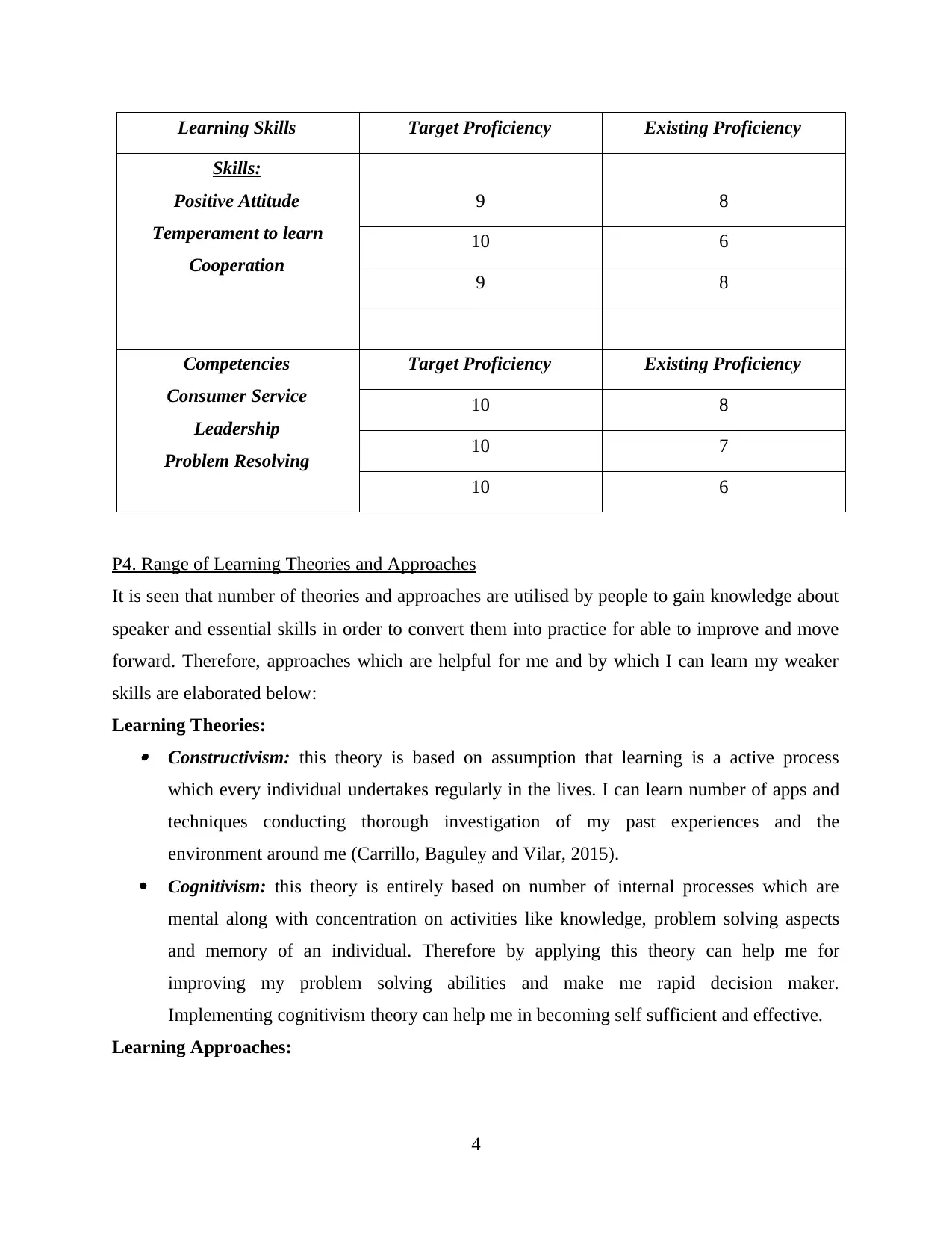
Learning Skills Target Proficiency Existing Proficiency
Skills:
Positive Attitude
Temperament to learn
Cooperation
9 8
10 6
9 8
Competencies
Consumer Service
Leadership
Problem Resolving
Target Proficiency Existing Proficiency
10 8
10 7
10 6
P4. Range of Learning Theories and Approaches
It is seen that number of theories and approaches are utilised by people to gain knowledge about
speaker and essential skills in order to convert them into practice for able to improve and move
forward. Therefore, approaches which are helpful for me and by which I can learn my weaker
skills are elaborated below:
Learning Theories: Constructivism: this theory is based on assumption that learning is a active process
which every individual undertakes regularly in the lives. I can learn number of apps and
techniques conducting thorough investigation of my past experiences and the
environment around me (Carrillo, Baguley and Vilar, 2015).
Cognitivism: this theory is entirely based on number of internal processes which are
mental along with concentration on activities like knowledge, problem solving aspects
and memory of an individual. Therefore by applying this theory can help me for
improving my problem solving abilities and make me rapid decision maker.
Implementing cognitivism theory can help me in becoming self sufficient and effective.
Learning Approaches:
4
Skills:
Positive Attitude
Temperament to learn
Cooperation
9 8
10 6
9 8
Competencies
Consumer Service
Leadership
Problem Resolving
Target Proficiency Existing Proficiency
10 8
10 7
10 6
P4. Range of Learning Theories and Approaches
It is seen that number of theories and approaches are utilised by people to gain knowledge about
speaker and essential skills in order to convert them into practice for able to improve and move
forward. Therefore, approaches which are helpful for me and by which I can learn my weaker
skills are elaborated below:
Learning Theories: Constructivism: this theory is based on assumption that learning is a active process
which every individual undertakes regularly in the lives. I can learn number of apps and
techniques conducting thorough investigation of my past experiences and the
environment around me (Carrillo, Baguley and Vilar, 2015).
Cognitivism: this theory is entirely based on number of internal processes which are
mental along with concentration on activities like knowledge, problem solving aspects
and memory of an individual. Therefore by applying this theory can help me for
improving my problem solving abilities and make me rapid decision maker.
Implementing cognitivism theory can help me in becoming self sufficient and effective.
Learning Approaches:
4
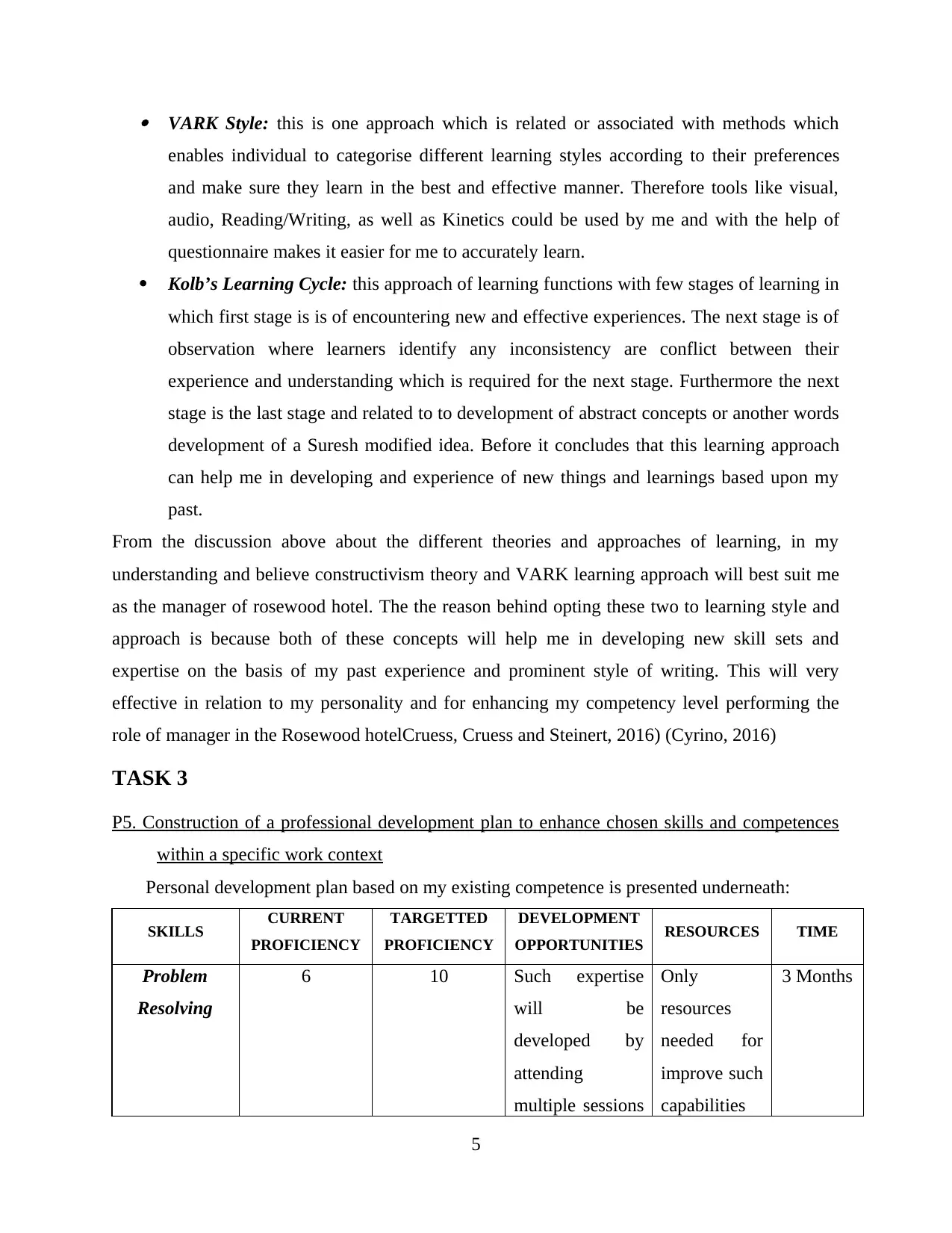
VARK Style: this is one approach which is related or associated with methods which
enables individual to categorise different learning styles according to their preferences
and make sure they learn in the best and effective manner. Therefore tools like visual,
audio, Reading/Writing, as well as Kinetics could be used by me and with the help of
questionnaire makes it easier for me to accurately learn.
Kolb’s Learning Cycle: this approach of learning functions with few stages of learning in
which first stage is is of encountering new and effective experiences. The next stage is of
observation where learners identify any inconsistency are conflict between their
experience and understanding which is required for the next stage. Furthermore the next
stage is the last stage and related to to development of abstract concepts or another words
development of a Suresh modified idea. Before it concludes that this learning approach
can help me in developing and experience of new things and learnings based upon my
past.
From the discussion above about the different theories and approaches of learning, in my
understanding and believe constructivism theory and VARK learning approach will best suit me
as the manager of rosewood hotel. The the reason behind opting these two to learning style and
approach is because both of these concepts will help me in developing new skill sets and
expertise on the basis of my past experience and prominent style of writing. This will very
effective in relation to my personality and for enhancing my competency level performing the
role of manager in the Rosewood hotelCruess, Cruess and Steinert, 2016) (Cyrino, 2016)
TASK 3
P5. Construction of a professional development plan to enhance chosen skills and competences
within a specific work context
Personal development plan based on my existing competence is presented underneath:
SKILLS CURRENT
PROFICIENCY
TARGETTED
PROFICIENCY
DEVELOPMENT
OPPORTUNITIES RESOURCES TIME
Problem
Resolving
6 10 Such expertise
will be
developed by
attending
multiple sessions
Only
resources
needed for
improve such
capabilities
3 Months
5
enables individual to categorise different learning styles according to their preferences
and make sure they learn in the best and effective manner. Therefore tools like visual,
audio, Reading/Writing, as well as Kinetics could be used by me and with the help of
questionnaire makes it easier for me to accurately learn.
Kolb’s Learning Cycle: this approach of learning functions with few stages of learning in
which first stage is is of encountering new and effective experiences. The next stage is of
observation where learners identify any inconsistency are conflict between their
experience and understanding which is required for the next stage. Furthermore the next
stage is the last stage and related to to development of abstract concepts or another words
development of a Suresh modified idea. Before it concludes that this learning approach
can help me in developing and experience of new things and learnings based upon my
past.
From the discussion above about the different theories and approaches of learning, in my
understanding and believe constructivism theory and VARK learning approach will best suit me
as the manager of rosewood hotel. The the reason behind opting these two to learning style and
approach is because both of these concepts will help me in developing new skill sets and
expertise on the basis of my past experience and prominent style of writing. This will very
effective in relation to my personality and for enhancing my competency level performing the
role of manager in the Rosewood hotelCruess, Cruess and Steinert, 2016) (Cyrino, 2016)
TASK 3
P5. Construction of a professional development plan to enhance chosen skills and competences
within a specific work context
Personal development plan based on my existing competence is presented underneath:
SKILLS CURRENT
PROFICIENCY
TARGETTED
PROFICIENCY
DEVELOPMENT
OPPORTUNITIES RESOURCES TIME
Problem
Resolving
6 10 Such expertise
will be
developed by
attending
multiple sessions
Only
resources
needed for
improve such
capabilities
3 Months
5
Paraphrase This Document
Need a fresh take? Get an instant paraphrase of this document with our AI Paraphraser
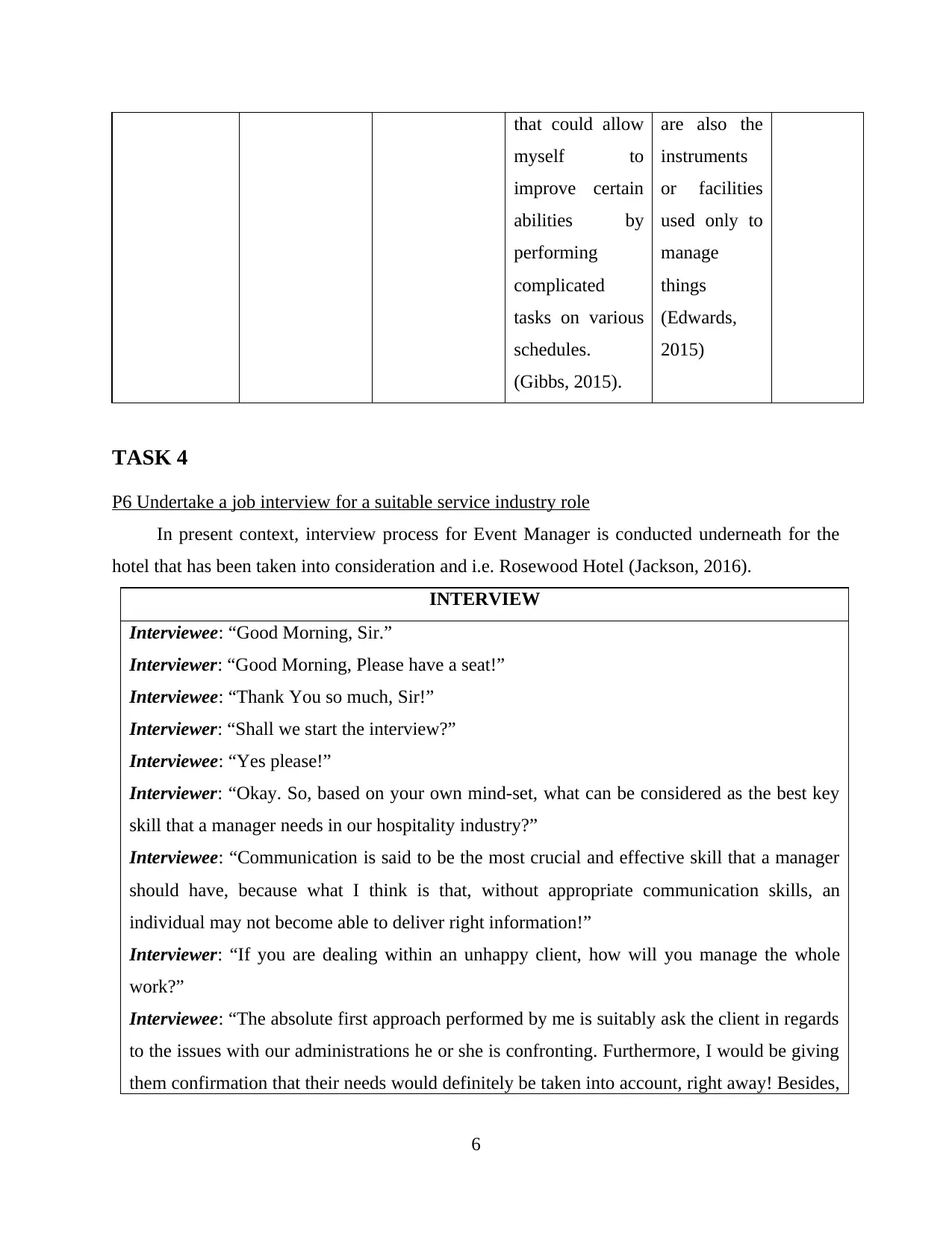
that could allow
myself to
improve certain
abilities by
performing
complicated
tasks on various
schedules.
(Gibbs, 2015).
are also the
instruments
or facilities
used only to
manage
things
(Edwards,
2015)
TASK 4
P6 Undertake a job interview for a suitable service industry role
In present context, interview process for Event Manager is conducted underneath for the
hotel that has been taken into consideration and i.e. Rosewood Hotel (Jackson, 2016).
INTERVIEW
Interviewee: “Good Morning, Sir.”
Interviewer: “Good Morning, Please have a seat!”
Interviewee: “Thank You so much, Sir!”
Interviewer: “Shall we start the interview?”
Interviewee: “Yes please!”
Interviewer: “Okay. So, based on your own mind-set, what can be considered as the best key
skill that a manager needs in our hospitality industry?”
Interviewee: “Communication is said to be the most crucial and effective skill that a manager
should have, because what I think is that, without appropriate communication skills, an
individual may not become able to deliver right information!”
Interviewer: “If you are dealing within an unhappy client, how will you manage the whole
work?”
Interviewee: “The absolute first approach performed by me is suitably ask the client in regards
to the issues with our administrations he or she is confronting. Furthermore, I would be giving
them confirmation that their needs would definitely be taken into account, right away! Besides,
6
myself to
improve certain
abilities by
performing
complicated
tasks on various
schedules.
(Gibbs, 2015).
are also the
instruments
or facilities
used only to
manage
things
(Edwards,
2015)
TASK 4
P6 Undertake a job interview for a suitable service industry role
In present context, interview process for Event Manager is conducted underneath for the
hotel that has been taken into consideration and i.e. Rosewood Hotel (Jackson, 2016).
INTERVIEW
Interviewee: “Good Morning, Sir.”
Interviewer: “Good Morning, Please have a seat!”
Interviewee: “Thank You so much, Sir!”
Interviewer: “Shall we start the interview?”
Interviewee: “Yes please!”
Interviewer: “Okay. So, based on your own mind-set, what can be considered as the best key
skill that a manager needs in our hospitality industry?”
Interviewee: “Communication is said to be the most crucial and effective skill that a manager
should have, because what I think is that, without appropriate communication skills, an
individual may not become able to deliver right information!”
Interviewer: “If you are dealing within an unhappy client, how will you manage the whole
work?”
Interviewee: “The absolute first approach performed by me is suitably ask the client in regards
to the issues with our administrations he or she is confronting. Furthermore, I would be giving
them confirmation that their needs would definitely be taken into account, right away! Besides,
6
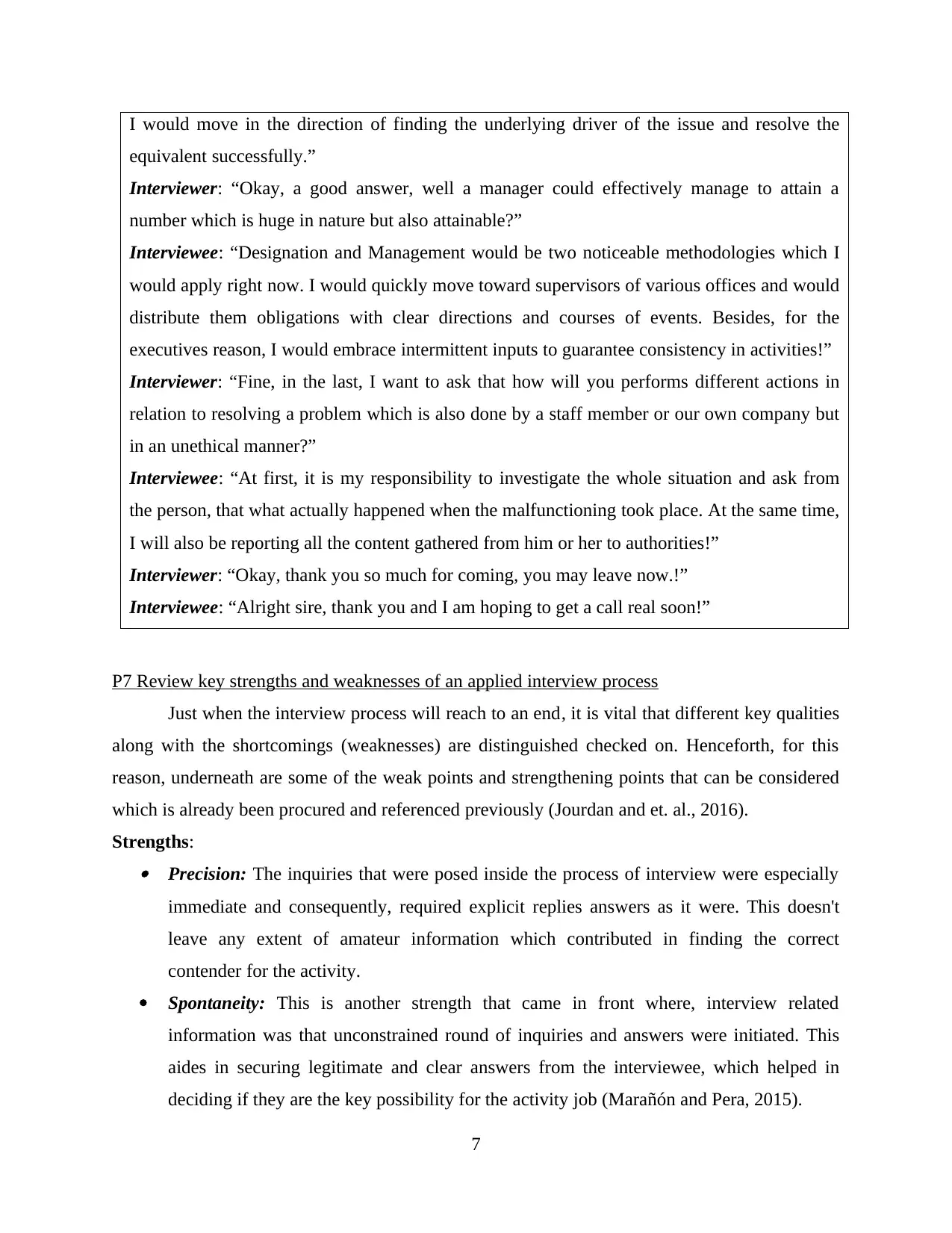
I would move in the direction of finding the underlying driver of the issue and resolve the
equivalent successfully.”
Interviewer: “Okay, a good answer, well a manager could effectively manage to attain a
number which is huge in nature but also attainable?”
Interviewee: “Designation and Management would be two noticeable methodologies which I
would apply right now. I would quickly move toward supervisors of various offices and would
distribute them obligations with clear directions and courses of events. Besides, for the
executives reason, I would embrace intermittent inputs to guarantee consistency in activities!”
Interviewer: “Fine, in the last, I want to ask that how will you performs different actions in
relation to resolving a problem which is also done by a staff member or our own company but
in an unethical manner?”
Interviewee: “At first, it is my responsibility to investigate the whole situation and ask from
the person, that what actually happened when the malfunctioning took place. At the same time,
I will also be reporting all the content gathered from him or her to authorities!”
Interviewer: “Okay, thank you so much for coming, you may leave now.!”
Interviewee: “Alright sire, thank you and I am hoping to get a call real soon!”
P7 Review key strengths and weaknesses of an applied interview process
Just when the interview process will reach to an end, it is vital that different key qualities
along with the shortcomings (weaknesses) are distinguished checked on. Henceforth, for this
reason, underneath are some of the weak points and strengthening points that can be considered
which is already been procured and referenced previously (Jourdan and et. al., 2016).
Strengths: Precision: The inquiries that were posed inside the process of interview were especially
immediate and consequently, required explicit replies answers as it were. This doesn't
leave any extent of amateur information which contributed in finding the correct
contender for the activity.
Spontaneity: This is another strength that came in front where, interview related
information was that unconstrained round of inquiries and answers were initiated. This
aides in securing legitimate and clear answers from the interviewee, which helped in
deciding if they are the key possibility for the activity job (Marañón and Pera, 2015).
7
equivalent successfully.”
Interviewer: “Okay, a good answer, well a manager could effectively manage to attain a
number which is huge in nature but also attainable?”
Interviewee: “Designation and Management would be two noticeable methodologies which I
would apply right now. I would quickly move toward supervisors of various offices and would
distribute them obligations with clear directions and courses of events. Besides, for the
executives reason, I would embrace intermittent inputs to guarantee consistency in activities!”
Interviewer: “Fine, in the last, I want to ask that how will you performs different actions in
relation to resolving a problem which is also done by a staff member or our own company but
in an unethical manner?”
Interviewee: “At first, it is my responsibility to investigate the whole situation and ask from
the person, that what actually happened when the malfunctioning took place. At the same time,
I will also be reporting all the content gathered from him or her to authorities!”
Interviewer: “Okay, thank you so much for coming, you may leave now.!”
Interviewee: “Alright sire, thank you and I am hoping to get a call real soon!”
P7 Review key strengths and weaknesses of an applied interview process
Just when the interview process will reach to an end, it is vital that different key qualities
along with the shortcomings (weaknesses) are distinguished checked on. Henceforth, for this
reason, underneath are some of the weak points and strengthening points that can be considered
which is already been procured and referenced previously (Jourdan and et. al., 2016).
Strengths: Precision: The inquiries that were posed inside the process of interview were especially
immediate and consequently, required explicit replies answers as it were. This doesn't
leave any extent of amateur information which contributed in finding the correct
contender for the activity.
Spontaneity: This is another strength that came in front where, interview related
information was that unconstrained round of inquiries and answers were initiated. This
aides in securing legitimate and clear answers from the interviewee, which helped in
deciding if they are the key possibility for the activity job (Marañón and Pera, 2015).
7
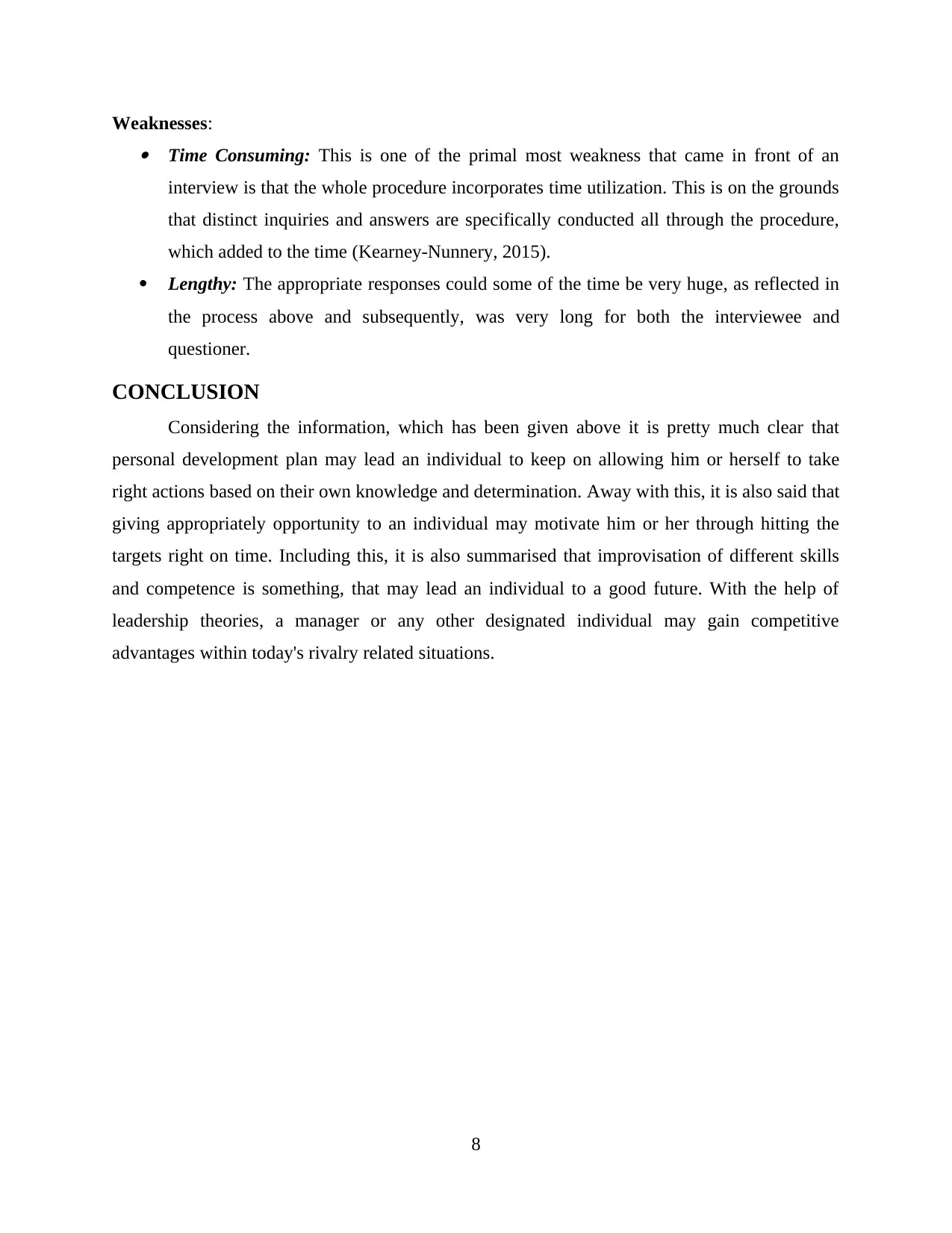
Weaknesses: Time Consuming: This is one of the primal most weakness that came in front of an
interview is that the whole procedure incorporates time utilization. This is on the grounds
that distinct inquiries and answers are specifically conducted all through the procedure,
which added to the time (Kearney-Nunnery, 2015).
Lengthy: The appropriate responses could some of the time be very huge, as reflected in
the process above and subsequently, was very long for both the interviewee and
questioner.
CONCLUSION
Considering the information, which has been given above it is pretty much clear that
personal development plan may lead an individual to keep on allowing him or herself to take
right actions based on their own knowledge and determination. Away with this, it is also said that
giving appropriately opportunity to an individual may motivate him or her through hitting the
targets right on time. Including this, it is also summarised that improvisation of different skills
and competence is something, that may lead an individual to a good future. With the help of
leadership theories, a manager or any other designated individual may gain competitive
advantages within today's rivalry related situations.
8
interview is that the whole procedure incorporates time utilization. This is on the grounds
that distinct inquiries and answers are specifically conducted all through the procedure,
which added to the time (Kearney-Nunnery, 2015).
Lengthy: The appropriate responses could some of the time be very huge, as reflected in
the process above and subsequently, was very long for both the interviewee and
questioner.
CONCLUSION
Considering the information, which has been given above it is pretty much clear that
personal development plan may lead an individual to keep on allowing him or herself to take
right actions based on their own knowledge and determination. Away with this, it is also said that
giving appropriately opportunity to an individual may motivate him or her through hitting the
targets right on time. Including this, it is also summarised that improvisation of different skills
and competence is something, that may lead an individual to a good future. With the help of
leadership theories, a manager or any other designated individual may gain competitive
advantages within today's rivalry related situations.
8
Secure Best Marks with AI Grader
Need help grading? Try our AI Grader for instant feedback on your assignments.
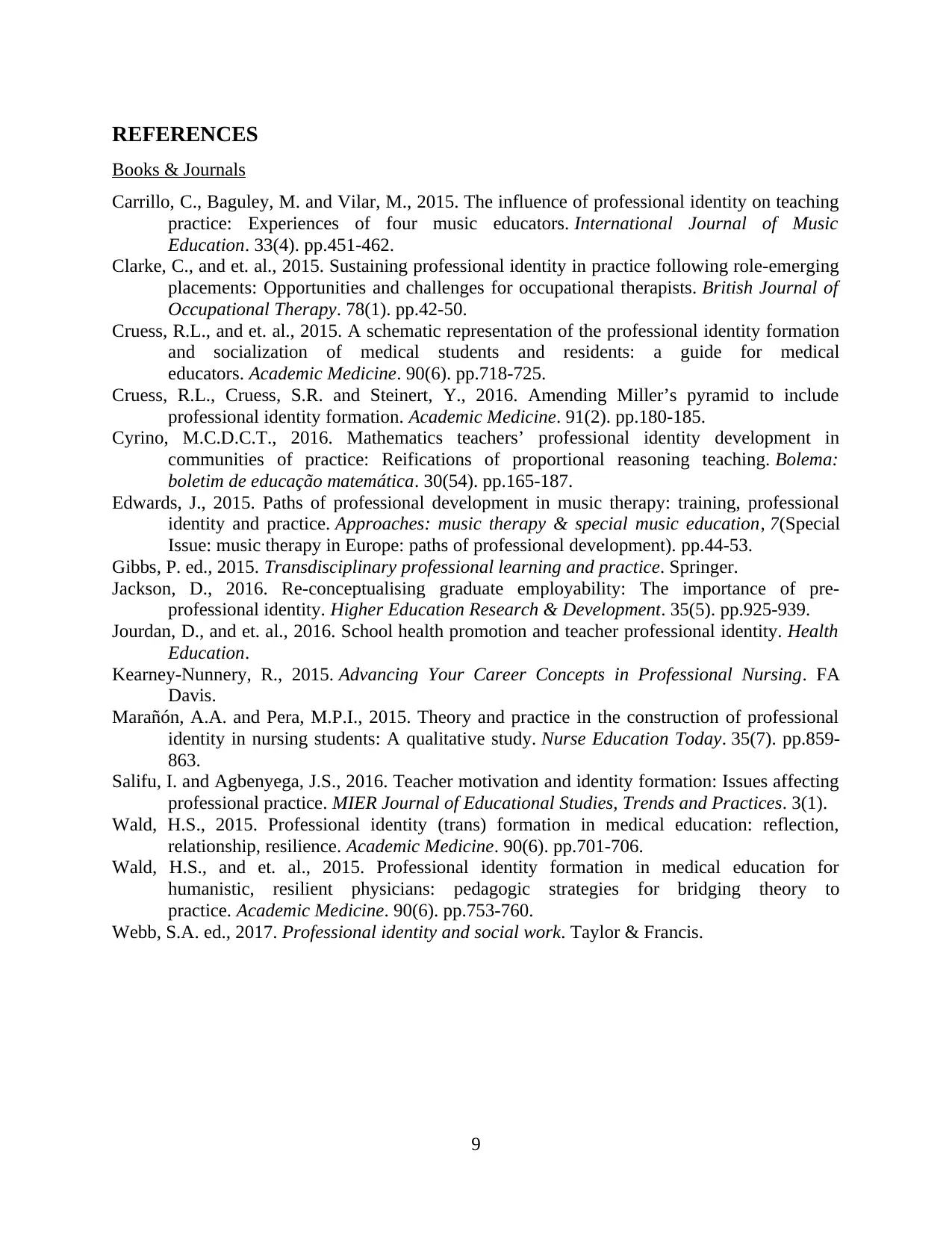
REFERENCES
Books & Journals
Carrillo, C., Baguley, M. and Vilar, M., 2015. The influence of professional identity on teaching
practice: Experiences of four music educators. International Journal of Music
Education. 33(4). pp.451-462.
Clarke, C., and et. al., 2015. Sustaining professional identity in practice following role-emerging
placements: Opportunities and challenges for occupational therapists. British Journal of
Occupational Therapy. 78(1). pp.42-50.
Cruess, R.L., and et. al., 2015. A schematic representation of the professional identity formation
and socialization of medical students and residents: a guide for medical
educators. Academic Medicine. 90(6). pp.718-725.
Cruess, R.L., Cruess, S.R. and Steinert, Y., 2016. Amending Miller’s pyramid to include
professional identity formation. Academic Medicine. 91(2). pp.180-185.
Cyrino, M.C.D.C.T., 2016. Mathematics teachers’ professional identity development in
communities of practice: Reifications of proportional reasoning teaching. Bolema:
boletim de educação matemática. 30(54). pp.165-187.
Edwards, J., 2015. Paths of professional development in music therapy: training, professional
identity and practice. Approaches: music therapy & special music education, 7(Special
Issue: music therapy in Europe: paths of professional development). pp.44-53.
Gibbs, P. ed., 2015. Transdisciplinary professional learning and practice. Springer.
Jackson, D., 2016. Re-conceptualising graduate employability: The importance of pre-
professional identity. Higher Education Research & Development. 35(5). pp.925-939.
Jourdan, D., and et. al., 2016. School health promotion and teacher professional identity. Health
Education.
Kearney-Nunnery, R., 2015. Advancing Your Career Concepts in Professional Nursing. FA
Davis.
Marañón, A.A. and Pera, M.P.I., 2015. Theory and practice in the construction of professional
identity in nursing students: A qualitative study. Nurse Education Today. 35(7). pp.859-
863.
Salifu, I. and Agbenyega, J.S., 2016. Teacher motivation and identity formation: Issues affecting
professional practice. MIER Journal of Educational Studies, Trends and Practices. 3(1).
Wald, H.S., 2015. Professional identity (trans) formation in medical education: reflection,
relationship, resilience. Academic Medicine. 90(6). pp.701-706.
Wald, H.S., and et. al., 2015. Professional identity formation in medical education for
humanistic, resilient physicians: pedagogic strategies for bridging theory to
practice. Academic Medicine. 90(6). pp.753-760.
Webb, S.A. ed., 2017. Professional identity and social work. Taylor & Francis.
9
Books & Journals
Carrillo, C., Baguley, M. and Vilar, M., 2015. The influence of professional identity on teaching
practice: Experiences of four music educators. International Journal of Music
Education. 33(4). pp.451-462.
Clarke, C., and et. al., 2015. Sustaining professional identity in practice following role-emerging
placements: Opportunities and challenges for occupational therapists. British Journal of
Occupational Therapy. 78(1). pp.42-50.
Cruess, R.L., and et. al., 2015. A schematic representation of the professional identity formation
and socialization of medical students and residents: a guide for medical
educators. Academic Medicine. 90(6). pp.718-725.
Cruess, R.L., Cruess, S.R. and Steinert, Y., 2016. Amending Miller’s pyramid to include
professional identity formation. Academic Medicine. 91(2). pp.180-185.
Cyrino, M.C.D.C.T., 2016. Mathematics teachers’ professional identity development in
communities of practice: Reifications of proportional reasoning teaching. Bolema:
boletim de educação matemática. 30(54). pp.165-187.
Edwards, J., 2015. Paths of professional development in music therapy: training, professional
identity and practice. Approaches: music therapy & special music education, 7(Special
Issue: music therapy in Europe: paths of professional development). pp.44-53.
Gibbs, P. ed., 2015. Transdisciplinary professional learning and practice. Springer.
Jackson, D., 2016. Re-conceptualising graduate employability: The importance of pre-
professional identity. Higher Education Research & Development. 35(5). pp.925-939.
Jourdan, D., and et. al., 2016. School health promotion and teacher professional identity. Health
Education.
Kearney-Nunnery, R., 2015. Advancing Your Career Concepts in Professional Nursing. FA
Davis.
Marañón, A.A. and Pera, M.P.I., 2015. Theory and practice in the construction of professional
identity in nursing students: A qualitative study. Nurse Education Today. 35(7). pp.859-
863.
Salifu, I. and Agbenyega, J.S., 2016. Teacher motivation and identity formation: Issues affecting
professional practice. MIER Journal of Educational Studies, Trends and Practices. 3(1).
Wald, H.S., 2015. Professional identity (trans) formation in medical education: reflection,
relationship, resilience. Academic Medicine. 90(6). pp.701-706.
Wald, H.S., and et. al., 2015. Professional identity formation in medical education for
humanistic, resilient physicians: pedagogic strategies for bridging theory to
practice. Academic Medicine. 90(6). pp.753-760.
Webb, S.A. ed., 2017. Professional identity and social work. Taylor & Francis.
9

10
1 out of 12
Related Documents
Your All-in-One AI-Powered Toolkit for Academic Success.
+13062052269
info@desklib.com
Available 24*7 on WhatsApp / Email
![[object Object]](/_next/static/media/star-bottom.7253800d.svg)
Unlock your academic potential
© 2024 | Zucol Services PVT LTD | All rights reserved.





